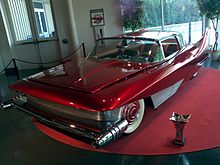| DiDia 150 | |
|---|---|
 | |
| Overview | |
| Production | 1953–1960 |
The 1960 DiDia 150 was a luxury, custom-designed iconic, handmade car also known as the "Dream Car" forever associated with its second owner, singer Bobby Darin. Built in Detroit, Michigan, clothing designer Andrew "Andy" Di Dia designed this "unrestrained and unconventional" automobile. Only one example was ever built.
Description
The car was originally powered by a 365 cubic inch Cadillac engine, later replaced by a 427 cubic inch high-performance Ford engine, and had a 125-inch wheelbase, with a tubular aluminum frame and a hand-fashioned soft aluminum body. The car has Batmanesque set of rear fins dominating the bodyline and ruby red hubcaps on whitewall tires. Writer Daniel Vaughan describes it as
...an exotic vehicle that is overdone in every detail and in every respect, an iconic dream car. Its metallic red paint was from 30 coats of paint with real ground diamonds for sparkle. ...The body is from hand-fashioned soft aluminum. There are hidden headlights and tail lights that swivel as the car turns. Inside, the seats each have their own ash tray, cigarette lighter, and radio speaker. On the dash are oversized levers that control the air conditioning, heater and defroster.
History
The car was designed by Andrew Di Dia, a clothing designer, who Bobby Darin had met while on tour in Detroit in 1957. Darin telling Di Dia at the time that he would purchase the car if he ever "hit it big".
For seven years, from 1953 to 1960 the DiDia 150 was hand-built by four workers, at a cost of $93,647.29 but sold to Darin in 1961 at a cost of over $150,000 (1.5 million today). At the time the car was listed as most expensive "custom-made" car in the world by the Guinness Book of Records. The body was hand-formed by Ron Clark and constructed by Bob Kaiser from Clark Kaiser Customs.

Darin drove his wife, Sandra Dee, in the car to the 34th Academy Awards in 1961.
When Bobby drove the car to the Academy Awards, I and Steve Blauner followed behind him in a limousine. The car had two fans and a switch that you had to turn on. Bobby didn't realize, so it heated up. All the magazines said the car caught fire but it didn't.
— Andrew Di Dia
Di Dia toured the car around the country, when Darin wasn't using it for public appearances. After publicity and film use, Darin donated his "Dream Car" to the National Museum of Transportation in 1970 where it remains. It was restored by Mike Manns of Manns Auto Body in Festus, Missouri before going on display.
Specifications

The gasoline-fueled V8 engine (originally 365 cid, later upgraded to 427 cid) is located at the front. It is rear-wheel drive. The body and chassis are hand-formed from 064 aluminum with a unitized alloy tube frame.
It has a glass cockpit in back, a squared steering wheel resembling a superellipse (with n = 3⁄2, a = b = 1) and thermostatically controlled air conditioning system. The interior is rust colored in contrast to the ruby paintwork. The design included the first backseat-mounted radio loudspeakers and hidden windshield wipers, which start themselves when it rains. Other features include retractable headlamps, rear turn signals which swivel as the car turns, 'floating' bumpers and a trunk that was hinged from the driver's side. Each of the four bucket seats have their own thermostatically controlled air conditioning, individual cigarette lighters and ashtrays, as well as a radio loudspeaker. The original engine, a Cadillac V8, was later replaced by a high-performance Ford engine when it was taken on the show circuit.
References
- ^ Benjiman, Stan (November 8, 1962). "Dream Car Cost $150,000, Took Seven years to Build". Gettysburg Times. p. 3. Retrieved 21 March 2012.
- ^ Nower, Lia. "Bobby Darin's Car Still A Dream". St. Louis Dispatch. Lee Enterprises. Retrieved February 23, 2012.
- Ernst, Kurt (March 12, 2014). "Andrew DiDia, designer of DiDia 150, dies at age 96".
- ^ "Featuring the Bobby Darin Dream Car". The Bay Area Observer. April 21, 2011. p. 5. Retrieved 20 March 2012.
- ^ Starr, Michael Seth (2011). Bobby Darin: A Life. Taylor Trade Publications. p. 97. ISBN 978-1-58979-598-3.
- DiOrio, Al (2004). Bobby Darin: The Incredible Story of an Amazing Life. Running Press. p. 164. ISBN 0-7624-1816-8.
- ^ Vaughan, Daniel (March 2010). "1960 Di Dia 150 - Overview". Conceptcarz.com. Retrieved February 23, 2012.
- "Darrin drives $100,000 Auto". The Milwaukee Sentinel. 1 April 1961. p. 11. Retrieved 20 March 2012.
- Du Brow, Rick (24 March 1961). "Car Cost $150,00 (Press Agent Says)". The Time-News. p. 30. Retrieved 20 March 2012.
- "Autos". Boys' Life. Boy Scouts of America. February 1969. pp. 18–19. ISSN 0006-8608. Retrieved 20 March 2012.
- ^ Barris, George; Scagnetti, Jack (1974). Cars of the Stars. Jonathan David Publishers. p. 93. ISBN 978-0-8246-0166-9.
- ^ Lynch, Charles (February 26, 2009). "Car Lust: The Bobby Darin Dream Car (1960 DiDia 150)". AmazonBlogs. Amazon.com. Archived from the original on July 4, 2011. Retrieved February 16, 2012.
- ^ Evanier, David (2010). Roman Candle: The Life of Bobby Darin. Suny Pres. pp. 169–170. ISBN 978-1-4384-3458-2.
- "Singer to drive $90,000 Dream Car". The Lewiston Daily Sun. April 1, 1961. p. 1. Retrieved 28 February 2012.
- ^ "Bobby Darin Dream Car". The St Louis Museum of Transportation. Transport Museum Association. Archived from the original on June 21, 2012. Retrieved February 23, 2012.
- Roberts, Chris. "Bobby Darin Dream Car". Manns Restoration & Maintenance. Retrieved February 28, 2012.